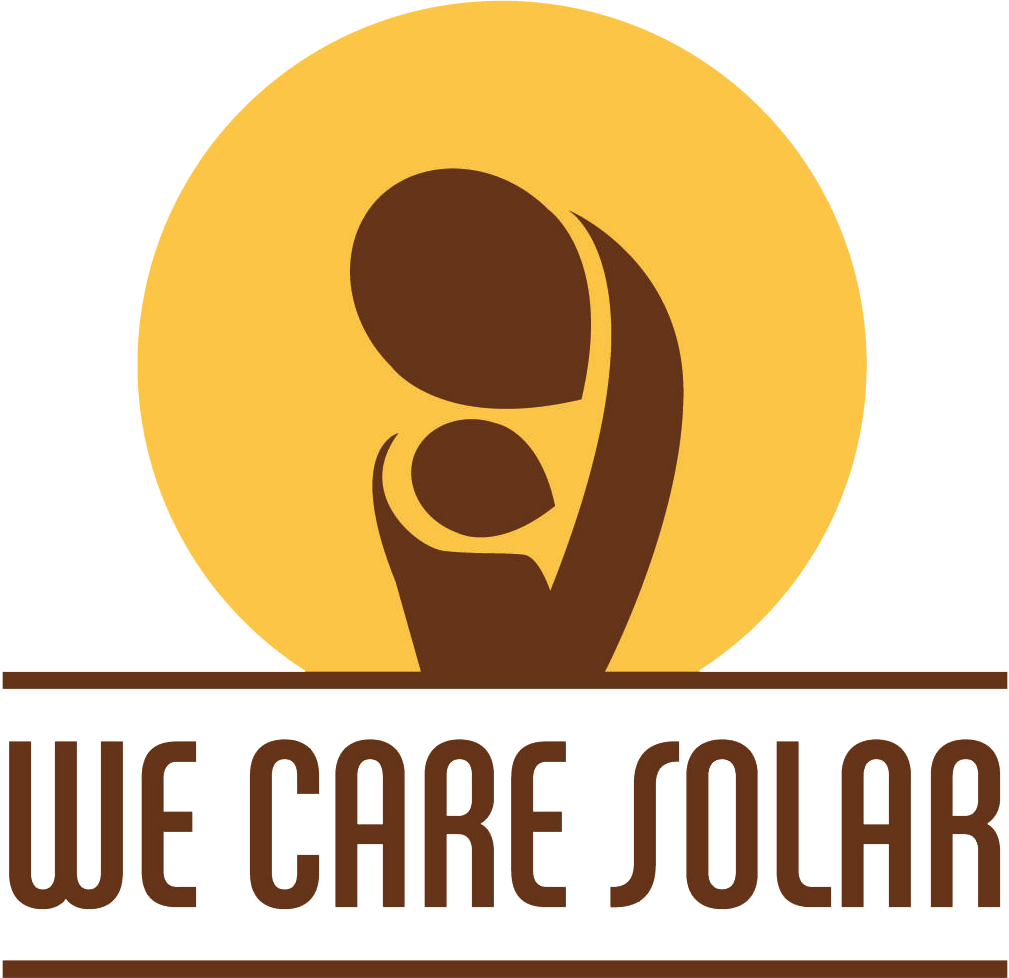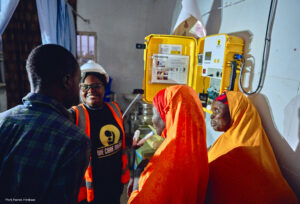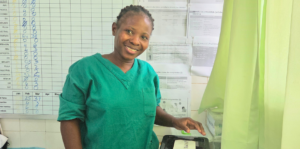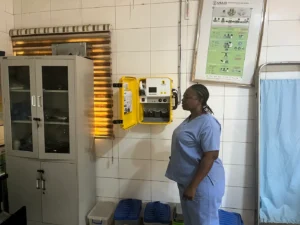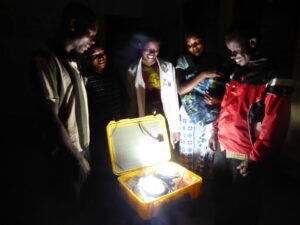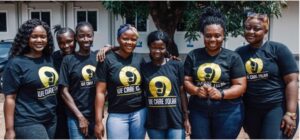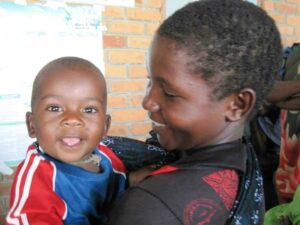I couldn’t have been happier when I received Muyi Lawal’s call. Muyi is the director of Solar Electric System’s, Ltd. in Nigeria. He was in the hospital parking lot, ready to get started on the solar electric installation. I ran over from the labor ward and saw him standing with Akai, his electrician. He was wearing a beautiful kaftan from Southern Nigeria, a swirl of purple and white batik, and I was delighted to see him. We greeted each other warmly, and I immediately asked for a photo to document the moment.
This moment had been months in the making. I had first thought about bringing solar to Kofan Gayan in March of 2008. When I came back from Nigeria I conferred with my husband, Hal Aronson, and another friend, Drew Sproul, to discuss how we could improve communication and lighting in the hospital. They had both been moved by my written accounts of the challenges of providing emergency care in a hospital without phones, running water, or reliable electricity, and they wanted to help. We all realized that lighting and communication were prerequisites for safe and efficient emergency obstetric care.
I knew any project of this sort would take money. Hal and I drew up plans for bringing solar electricity to the maternity ward, labor room, and operating theatre, and I assigned Drew the task of finding a suitable mobile communication device. A CITRIS competition at UC Berkeley offering a grand prize of $12,500 for a technological solution to a social problem prompted us to submit a proposal. Let’s retrofit the hospital with solar electricity to provide reliable lighting and electricity for the suction machines, and let’s find walkie-talkies that will permit the nurses to instantly call doctors when emergencies arise, we thought.
The school-wide competition encouraged teams of students to work together, and a little investigation led me to two terrific graduate students – Melissa Ho and Christian Casillas. Both were willing to sign on to the project. Melissa was the star of the Information Technology Department, and her work on communications in Ghana made her sensitive to the plight of the Nigerian health workers. Christian was a gem in the ERG department (Energy Resources Group), with expertise in solar and wind technology. He had lived in Africa as part of a Peace Corp mission, and was currently invested in a project in Nicaragua.
The five of us (Hal, Drew, Melissa, Christian, and I) put our heads together and drew up plans for a white paper to be submitted to the CITRIS competition. With record-breaking speed, we came up with a decent proposal and signed on two faculty advisers before submitting our entry.
Though our project didn’t garner top prize in the competition, it did bring us some critical exposure, leading to our eventual funding by the Berkeley Big Ideas and Blum Center for Developing Economies.
The actual completion of the project was much more arduous. I needed to find a solar electric company on the other side of the planet that I could trust and work with. I needed to test out equipment, modify our design several times, and find a walkie-talkie that could fit the requirements of the hospital workers. I needed to see if the ideas we came up with in Berkeley would appeal to the hospital staff itself. After all, they had never been directly consulted about the concept of solar electricity – this scheme was largely concocted in Berkeley.
I returned to Nigeria in August 2008, armed with a miniature prototype of the solar electric system we were proposing. My initial knowledge of solar electricity was almost nil, and Hal invited me to take one of his week long “Solar Schoolhouse” workshops in the summer. He taught me the basics of wiring, but to minimize error, he found a way to secure the guts of the solar electric system to a small wooden board that I could pack into my suitcase. He donated two thin portable solar panels to the cause that could also fit into my luggage, and…THE SOLAR SUITCASE was born.
The equipment was met with unanimous enthusiasm when I demonstrated it to hospital workers in August. They thought the lights and the walkie-talkies would be a great improvement to care, and we moved forward with our plans. I had brought two LED headlamps with me on this visit, and these used rechargeable batteries that could be charged with the solar panels. I also brought four donated walkie-talkies with rechargeable batteries, courtesy of FAST RADIOS, a company that offered to help out when they heard about the cause.
Finding a way to keep within our fixed budget was hard, and I began to find ways to fundraise for more supplies. At times, the project seemed overwhelming. It was difficult to make regular contact with ANYONE in Nigeria. The phone lines and internet are not dependable, and communications that should have taken hours took weeks. The walkie-talkies I had left at the hospital were unable to maintain power throughout the entire night, and needed to be replacement with more modern models. The tiny battery I had brought in August for demonstration purposes was unable to store adequate power during the prolonged rainy season. There were a number of times when I wanted to give up. I had no experience in project management, or financing, or business, or any one of a number of skills that would have been helpful.
But through my contacts at UC Berkeley, I was able to give lectures about maternal mortality and emergency obstetric care in Northen Nigeria, always including a plug for the solar intervention we planned. One thing was for sure- our project (named WE CARE – Women’s Emergency Communication and Reliable Electricity) seemed to strike a chord for everyone who heard about it.
In February, I got the emotional boost I needed. I sponsored a fundraising party that allowed me to purchase headlamps for all the night duty workers in the hospital, and enough brand new walkie-talkies to replace the used ones that were failing in the field.
I bought a plane ticket for Nigeria using leftover funds from my internship with the Bixby Center for Population and Sustainability. I then asked the university to release the funds were awarded to WE CARE back in April 2008. This was a more difficult process than I ever imagined, but having an airline ticket in hand proved to be a powerful motivator. Days before my departure, the funding came through, the solar electric company agreed to make the hospital installation their top priority, and my dream seemed to be coming to fruition.
All of this was in the back of my mind as I greeted Muyi and his staff. We toured the hospital grounds and mapped out the lighting for each of the wards, making some small changes along the way. Muyi was exceptionally nice to have made the three hour journey from Abuja, and stayed throughout the day to await his employees who drove a truck from his warehouse in Jos.
At 6 pm, the truck arrived at the hospital, and the men unloaded the solar panels, batteries, and lights as the sun began to set. It was a moment to be cherished – the project was really happening! Muyi and his workers are staying at my hotel this evening, and we plan to return in the morning to begin the installation process.
My deepest thanks to everyone who contributed their time, expertise, energy, and money to this project! It is a dream come true!
